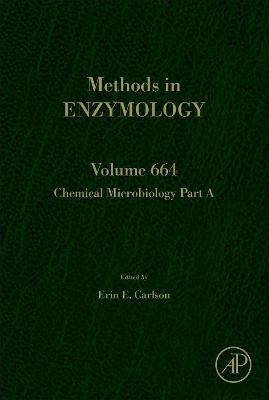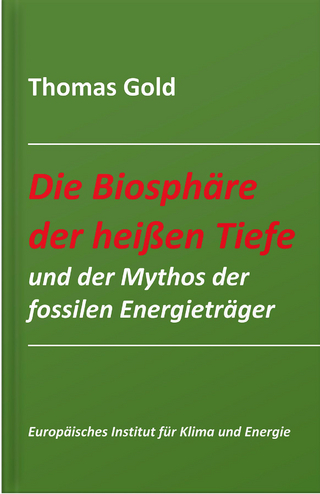
Chemical Tools in Microbiology 1
Academic Press Inc (Verlag)
978-0-323-91222-8 (ISBN)
Other chapters cover Multiplex fluorescence screening and identification using multiplex TMT, Customized Peptidoglycan Surfaces to Investigate Innate Immune Recognition via SPR, Site-Specific Siderocalin Binding to Ferric and Ferric-Free Enterobactin As Revealed by Mass Spectrometry, Proteomics of short-chain fatty acid probes in Salmonella, Development and application of highly sensitive labeling reagents for amino acids, and a variety of other timely topics.
Erin E. Carlson received her B.A. at St. Olaf College (Northfield, MN) in 2000. She went on to graduate studies funded by the NIH Predoctoral Biotechnology Training Program at the University of Wisconsin - Madison and earned a Ph.D. in organic chemistry in 2005 under the direction of Professor Laura L. Kiessling. Her graduate career focused on the design and synthesis of mechanistic probes and inhibitors for carbohydrate-binding proteins, concentrating on the study of UDP-galactopyranose mutase (UGM), an enzyme involved in cell wall biosynthesis of Mycobacterium tuberculosis. Subsequently, Dr. Carlson was awarded an American Cancer Society Postdoctoral Fellowship for studies at The Scripps Research Institute with Professor Benjamin F. Cravatt. Carlson and Cravatt developed a global metabolite profiling strategy that utilizes chemoselective probes to enable enrichment and profiling of metabolites from complex biological systems. This technology, referred to as Metabolite Enrichment by Tagging and Proteolytic Release (METPR), facilitates the rigorous characterization of biochemical pathways through their most sensitive reporter, endogenous small molecules. In 2007, Dr. Carlson received an NIH Pathway to Independence Award (K99/R00) and joined the faculty at Indiana University in 2008. In the summer of 2014, she joined the faculty in the Chemistry Department at the University of Minnesota and was appointed as a Graduate Faculty member of the Department of Medicinal Chemistry, the Department of Biochemistry, Molecular Biology and Biophysics and the graduate program in Biomedical Informatics and Computational Biology in 2015. Since the start of her independent career, she has won numerous awards including being named a Presidential Early Career Awards for Scientists and Engineers (PECASE) recipient, a Pew Biomedical Scholar, the NIH Director’s New Innovator Award, the Indiana University Outstanding Junior Faculty Award, the NSF CAREER Award, the Cottrell Scholar Award and was named a Sloan Research Fellow and an Indiana University Dean's Fellow. Professor Carlson has been highlighted in several videos including one produced by NBC in their Science Behind The News series, a fast-paced video series supported by the National Science Foundation. This piece was one of five videos highlighting work funded by NSF's Directorate for Mathematical and Physical Sciences. She was also featured in a "Brilliant Minds" video. Dr. Carlson was also named one of "Tomorrow's PIs" in the sixth annual issue of Genome Technology and received the Outstanding Postdoctoral Mentor Award from the University of Minnesota Postdoctoral Association in 2017.
1. Integration of bioinformatic and chemoproteomic tools for the study of enzyme conservation in closely related bacterial species 2. A Ligand Selection Strategy to Customize Small Molecule Probes for Activity-Based Protein Profiling (LS-ABPP) 3. Activity-based probes for bacterial histidine kinases 4. BSH-TRAP: Bile salt hydrolase tagging and retrieval with activity-based probes 5. Detecting and Identifying Glycoside Hydrolases Using Cyclophellitol-Derived Activity-Based Probes 6. Chemical proteomics for identifying short-chain fatty acid modified proteins in Salmonella 7. Kinetic dissection of macromolecular complex formation with minimally-perturbing fluorescent probes 8. Mobilization of Cryptic Antibiotic Biosynthesis Loci from Human-Pathogenic Nocardia 9. Endogenous Enzymes Enable Antimicrobial Activity 10. Identification of terpene synthases in higher fungi: combining analytical and bioinformatic methods 11. Bile salt hydrolase profiling by fluorogenic probes in the human gut microbiome 12. Optimized APEX2 peroxidase-mediated proximity labeling in fast- and slow-growing mycobacteria
| Erscheinungsdatum | 19.03.2022 |
|---|---|
| Reihe/Serie | Methods in Enzymology |
| Verlagsort | Oxford |
| Sprache | englisch |
| Maße | 152 x 229 mm |
| Gewicht | 610 g |
| Themenwelt | Naturwissenschaften ► Biologie ► Biochemie |
| Naturwissenschaften ► Biologie ► Genetik / Molekularbiologie | |
| Naturwissenschaften ► Biologie ► Mikrobiologie / Immunologie | |
| ISBN-10 | 0-323-91222-2 / 0323912222 |
| ISBN-13 | 978-0-323-91222-8 / 9780323912228 |
| Zustand | Neuware |
| Haben Sie eine Frage zum Produkt? |
aus dem Bereich


